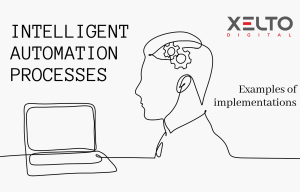I’m smart, I’m courteous – I’m already well prepared to automate a number of business processes in a cultural way for you. As you well know,, companies use a lot of applications, run on multi-year systems, and process a huge amounts of data that are growing daily.
One day, we got into a discussion about ODBC with Tomek. I like our conversations very much – we both believe that the impossible is does not exist:
With the expert’s eye:
Working with data is an integral part of many processes – Machine Learning, Data Science, and also RPA often need to operate on complex data sets with thousands of records. In each of these cases, the correctness of data is very important and, unfortunately, the human factor is highly susceptible to errors. However, we can deal with these issues in different ways.
During automation we often cope with the complex processing of large amounts of data that may stop the process at different stages, which results in less or more time loss. Therefore, it is an excellent idea to use databases of automated applications to verify supported data. Applications often have built-in input field validation capabilities, and thanks to the access we have to them, we can eliminate some process-impacting errors at an early stage.
The UiPath.database.activities package is very useful for this, as it allows us to create a connection to the database through the ODBC interface, and then work with data in read and write mode. A simple example is the processes running in the ERP JD Edwards system where automation often requires the creation of new records (usually by interconnected applications). In addition, let’s stress that this system is less suited for automation, which means that some tasks can only be accelerated to a limited extent. Any time saving is valuable to us, and it is very desirable to exclude erroneous actions at an early stage. In this system, we can verify the sample input data (to be typed in one of the applications) at the very beginning by checking that the data selected by the user in the source tables storing possible values for these fields actually exist.
Thanks to the above operations, we can reject erroneous tasks in a few moments, without having to catch errors when processing tasks in the JDE system, thus gaining time which is so valuable to users. It is also an additional advantage for high-priority and highly complex processes. Informing the user that his or her task contains errors before it is actually processed makes it possible to minimise the issue of urgent tasks that go beyond the specific time frame.
The interface operation by a robot is probably more spectacular for users. However, everything we can do by using e.g. API to improve safety, reliability and the efficiency of a robot seems reasonable. Therefore, we recommend the cooperation of robots with databases to improve performance and thus satisfy the end-users of our processes.
Autor: Tomasz Sioła – RPA Developer
Foto: iStock






